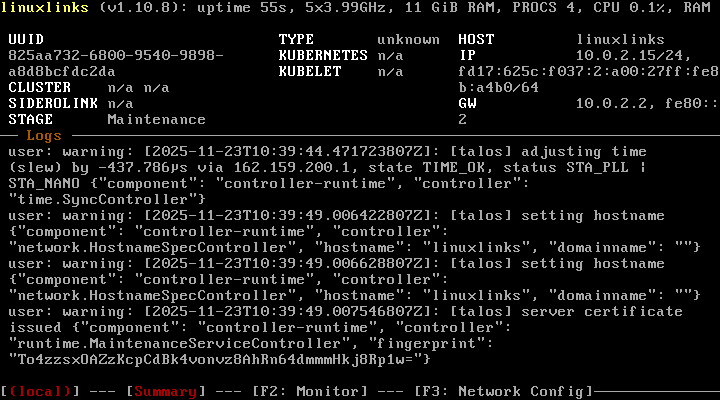Talos Linux is designed from the ground up as a secure, immutable, and minimal operating system for Kubernetes. It removes configuration drift by treating infrastructure as code. Boot it on bare metal or in a VM and have a Kubernetes cluster in minutes.
It runs on your Kubernetes nodes and hosts your workloads. It also runs the Kubernetes control plane components including the etcd database. With a single use case and focus it removes complicated and fragile configuration, maintenance, and security vulnerabilities. It’s designed to be as minimal as possible while still maintaining practicality. For these reasons, Talos has a number of features unique to it:
- API managed.
- Immutable file system.
- Minimal packages.
- Secure by default.
Talos can be deployed anywhere you can run a modern Linux kernel. Talos is managed by a single, declarative gRPC API.
Kubernetes is an open-source system that automates container deployment tasks. It was originally developed at Google but is now maintained as part of the Cloud Native Computing Foundation (CNCF).

| Working state: | Active |
| Desktop: | - |
| Init Software: | - |
| Package Management: | - |
| Release Model: | Fixed |
| Platforms: | aarch64, armv7, x86_64 |
| Home Page: | www.talos.dev |
| Developer: | Sidero Labs |
| This article is part of our Big List of Active Linux Distributions. |
What's a Linux distribution ("distro")? |
| A distro provides the user with a desktop environment, preloaded applications, and ways to update and maintain the system. Each distro makes different choices, deciding which open source projects to install and provides custom written programs. They can have different philosophies. Some distros are intended for desktop computers, some for servers without a graphical interface, and others for special uses. Because Linux is an open source operating system, combinations of software vary between Linux distros. |

